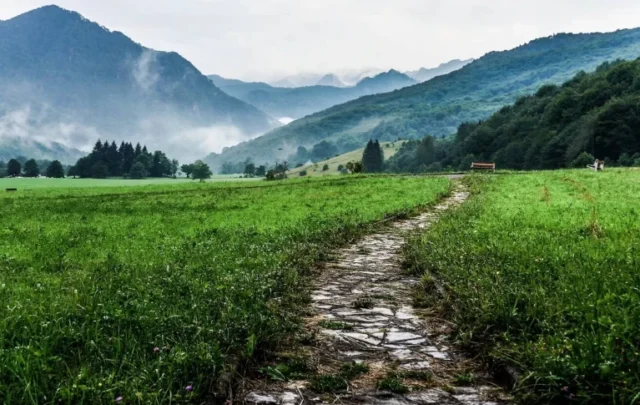 It’s been five months since I last wrote for The Earth Blog; to be honest I’ve been doing better things, like working within my community, enjoying my family as they grow up, keeping the house and garden ticking over in the frigid winter months and welcoming the perfections of spring days with a wonder that only comes from connection with the place I now call “home”. I’ve also been writing a second book, but that’s a different story, and one that I won’t dwell on for now.
It’s been five months since I last wrote for The Earth Blog; to be honest I’ve been doing better things, like working within my community, enjoying my family as they grow up, keeping the house and garden ticking over in the frigid winter months and welcoming the perfections of spring days with a wonder that only comes from connection with the place I now call “home”. I’ve also been writing a second book, but that’s a different story, and one that I won’t dwell on for now.
Five months and a new essay, but one that shares striking similarities with the opening of the last one – for this is also about making the most of what is within your reach, nurturing it and understanding it. I recall that ride over the hill into the teeth of the Autumn wind every time I make the same journey. The plum trees have just finished blossoming and I have found some fruiting cherries along with enough firewood to carry us through next winter on similar journeys – that and a procession of car-encapsulated people who must travel as fast as they can, as far as they feel merely to fulfil what they see as necessity. I have yet to ride to Kelso, another 4 miles or so further than my Melrose jaunt: there are busier roads and there isn’t much more to find and, yes, we drive. Sometimes, as last week, it is essential from my point of view (to collect that wood which now sits at the side of the house waiting to be sawn up); sometimes it is useful, and sometimes it is just for the pleasure of being somewhere else – usually when we are with someone else who wants to see what there is around us.
But there are limits. Often we make subconscious decisions that negate the need to vocalise our thoughts. “That’s too far” or “We don’t need to do that” take precedence over “That would be nice to do” more often than not. That doesn’t make us perfect by any means, and to be honest the pursuit of perfection is bound to end in failure – humans have randomness built in, and our foibles are often what distinguish character from bland compliance. I don’t want to be perfect; I just want to be honest. With that in mind, here’s a question we all need to answer:
Where is the nearest place to you that you like to be?
Yesterday I was reading through some writing, lying in the front room, sun falling on my face, birdsong floating through the open window. That was lovely. Today I was popping a couple of small loaves of bread round to a friend (I am experimenting with open loaves and have to make them small to fit the rising mounds of heated dough into the oven), and took the back way past sheaves of wild garlic, up the side alley where the ground never dries, and back to the main road where a cup of coffee always greets me in the house with the blue door. That is pretty special, and I can have tea if I want. Simple things, and so close; and you might have something like them. But for many people such idylls are harder to find, not necessarily because they are far away but because they seem unattainable. Are they, though?
One of my favourite spots as a child was a tree in the middle of a broken up Tarmac parking area where my sister and I used to play imagination games, and hunt for slow-worms among the grass edges. It was a crappy spot that appeared like so many other bits of “wasteland” to hold no pleasures, but we thought it was special and would head for it in preference to the municipal park that would take 10 minutes to reach rather than a sharp sprint to the end of the road. The park was fine if we asked first and stayed together. The tree on the Tarmac was within the limit our parents defined as “just round the corner” so we could visit it whenever we wished. Its closeness was part of its appeal: in a way that tree was ours.
In summer holidays thousands of students from Britain go over to India, Thailand and Vietnam to experience something they then place on their Facebook and Flickr pages in the form of albums of joy – or perhaps gloating. I sometimes come across these, or others from American students in Machu Picchu; Australian students in London; X students in Y faraway place…all taking similar experiences and memories from somewhere the appeal of which seems to lie in its distance more than anything else. The oddest thing of all about these forays to faraway places is the lack of connection they generate. For some it may be a moment of mental realignment, but for most they experience only what their own cultural window can comprehend. They are observers in a place alien to them (though, sadly, becoming less alien with each new hotel, shopping mall and advert for Bud Light) – distance has brought them to what is essentially a very large television screen with fantastic surround sound.
That’s not to say that experiencing other cultures is wrong – it can make us see where our culture is going so wildly off-kilter as to have become the globally destructive force it is – but they are not our cultures, and so we can only make of them that which is within our experiential boundaries. We have to find our own special places, not borrow (and often steal) those which belong to someone else.
Which brings me back to the places we can go to now. Walk out of the door and keep walking until you find somewhere that belongs to you; places you feel a connection to. They don’t need to be green, flowing, sun-kissed or rain-washed. Do you know your neighbours? Could you knock on their doors and be welcomed in for a drink and a chat? Where is the nearest place you can join with people who are special to you – a local pub or a cafe maybe, or a community centre, bench, piece of pavement?
Such inconsequential places, and such seemingly trivial reasons to go there. Just a few words, a bite to eat, a passing smile, a friendship reignited, a love on fire. We ignore these local places because the civilized world insists that our boundaries are distant, we can achieve anything, we have no limits. The Diaspora of our mechanised, electrical, money-soaked commercial excesses has, indeed, reached round so far it hits itself on the back, and screeches past to take another lap of the little blue-green dot we live on. In universal terms Earth is a dot. In human terms it is all we can ever intimately know as a species, and as I look out of my window I can see – what? – a few hundred metres; a couple of miles if I get up high.
Why go further when what really make our days go round are those apparently inconsequential dealings with the things that are so close to us? Yet we choose to ignore them because there is a bigger world out there. I refuse to accept that and choose the places I can walk to, run through and, if I really want to open my mind up, cycle there and back. That is my limit; all I can really know, and love, and nurture.
One day we will be forced to accept that the limitless world we thought there was is closing in once more. Back to where we started, like the frog who refused to accept there was anything beyond the woods, not because the frog was stupid, but because the frog had all it needed right there in the little piece of world it knew.





